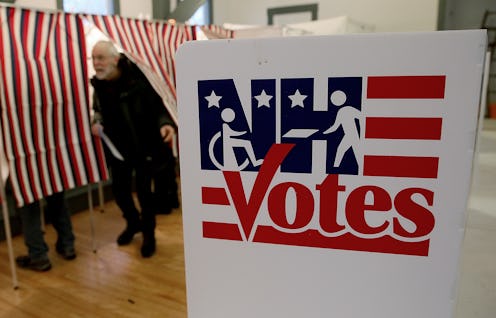News
How Many Delegates It Takes To Win The Nomination
On Tuesday, New Hampshire held the nation's first primary of the 2016 election (Iowa was a caucus), awarding Donald Trump and Bernie Sanders more delegates than their opponents. Much like the electoral college in general elections, the delegate system that determines who wins each party's presidential nomination is pretty confusing. If you're following the primaries and caucuses, the main thing you need to know is how many delegates a candidate needs to win the nomination.
Before the Republican and Democratic parties decide which candidates will represent them in the general election in November, every U.S. state and territory holds a primary or caucus between February and June, giving a certain number of their delegates to the winners. So, the Republican and Democratic National Committees don't simply choose their favorite politician. The two parties distribute delegates differently, though — the Democrats assign delegates based on what percentage of the vote each candidate won, whereas the Republicans do it differently from state to state, some using the proportional method and some opting for a winner-takes-all style. While actual votes don't determine the nominees, people's votes do decide how many delegates each presidential hopeful receives, because politics always has to be a little more complicated than necessary.
The Republican party has a total of 2,472 delegates that will select the 2016 nominee. In order to win, a GOP candidate needs 50 percent of the delegates, plus one — meaning they need a total of 1,237 delegates. On the Democratic side, Sanders or Hillary Clinton need 2,382 of the total 4,763 delegates to be their party's nominee (also 50 percent plus one).
Aside from delegates pledged to a specific candidate based on the primary votes, each party has superdelegates who can vote for whoever they want. Superdelegates are typically either current or former party leaders or elected officials. Because so many superdelegates have already pledged their support for Clinton, she already has 394 delegates, compared to Sanders' current 42. Based on only the Iowa caucus and New Hampshire primary, Clinton has 32 and Sanders has 36. After his big win in New Hampshire, Trump has a total of 17 delegates, followed by Ted Cruz with 10 and Marco Rubio with 7. Republican superdelegates haven't pledged support to specific candidates yet, so their votes haven't been factored in.
There are still a lot of primaries and caucuses yet to happen, but 1,237 and 2,382 are the magic numbers for the GOP and Democratic parties respectively.
